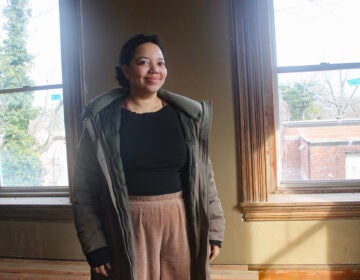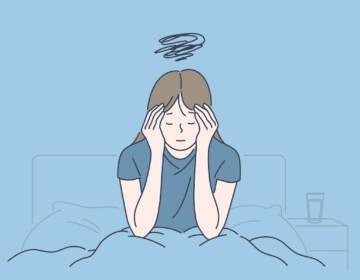A night shift doctor’s quest for daytime shuteye
Listen
After the night shift in the ER, Dr. Dorian Jacobs spends time with her toddler and dog before heading to sleep. (Jessica Kourkounis/for WHYY)
After working overnight, an ER doctor does her best to sleep during the sunniest hours.
While Dorian Jacobs’ husband and toddler live to the beat of our natural circadian rhythm, working and playing during the day and sleeping at night, Jacobs struggles to get her rest during the sunniest hours. She has been working the night shift at Crozer Chester Medical Center’s emergency room for a year now.
“It’s insanity,” Jacobs says of the adjusted schedule.
When the sun rises and she leaves the “constant cacophony” of a noisy emergency department, she’s met by a different kind of “chaos” at home: that of her two-year-old son and dog, running around and playing with each other.
It can be hard to keep up.
“I have a pretty limited time before I become incoherent and need to be asleep,” Jacobs says. “I’m not sure whether that’s because of the circadian cycle, but I feel much more exhausted and brain dead at 7 or 8 in the morning versus staying up until 11 or 12 at night.”
Before long, her her son heads to school, the dog to doggy daycare, and her husband to work.
“There’s nothing as magical as a quiet, empty house with the promise of six or seven hours of uninterrupted sleep,” Jacobs says. “That’s such an amazing prospect.”
Except there is one problem with all of this.
“I can’t actually sleep with that beautiful, overpowering silence,” Jacobs says.
Soon that silence fills with the daily sounds of the street and the daytime bustle on the other side of her window.
“That is not conducive to me sleeping,” she explains.
Like others on the night shift, Jacobs has developed her own system for daytime sleeping.
“A lot of emergency medicine doctors have their tailored caves,” she says.
Her own “cave” or bedroom has blackout curtains to keep out the outside light. She keeps the door closed, but, most importantly, she has two sound machines and a loud fan that she uses even in the winter to block out the outside noise.
Her husband hates it, but “he’s a trooper.”
One of her sound machines always sits on her night stand, blasting white noise out of its tiny speaker. The second one, which she plays through an app on her phone and a bluetooth speaker, sounds like being on an airplane wing in flight.
The two conflicting white noises are key to blocking everything else out.
“White noise is the only way that I can sleep,” Jacobs says.
Despite working the night shift, Jacobs has never stuck to a completely daytime sleep schedule. On days off, she stays awake during the day to spend time with family.
“Otherwise, I miss out on my life,” she says, acknowledging she’s not sure how long she can keep that up.
“It’s pretty hard to have a nocturnal schedule all the time. It’s certainly not sustainable for any long period of time.”
University of Pennsylvania sleep researcher David Dinges agrees with Jacobs. “The concept that you can train yourself to be a night person, or to sleep less, those kinds of things are not supported by scientific data,” he says.
According to Dinges, any exposure to light sets your biological clock back to “day/wake period,” which makes it very difficult to settle in for a long, deep sleep.
“And as a result most shift systems involve everybody [sharing] some of the pain. Everybody has to cycle through nightshift once in a while,” he says. That system can help mitigate some of the health issues associated with working the night shift and ignoring natural circadian rhythms.
For more information on how working the night shift can affect your health, listen to the interview above with University of Pennsylvania sleep researcher David Dinges.
WHYY is your source for fact-based, in-depth journalism and information. As a nonprofit organization, we rely on financial support from readers like you. Please give today.






